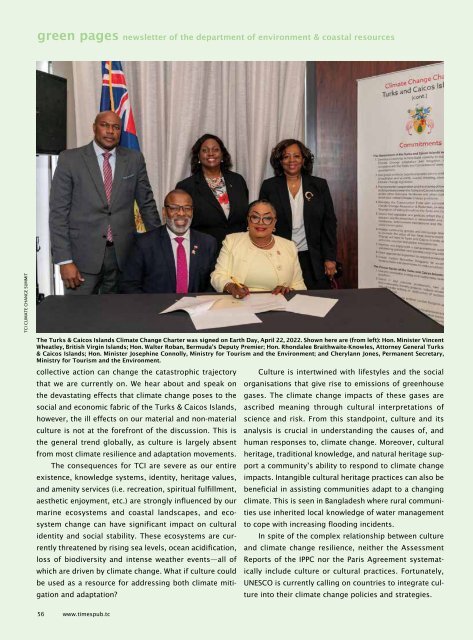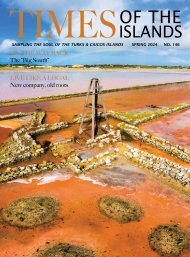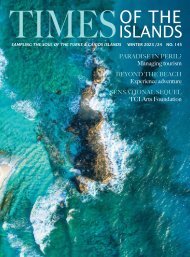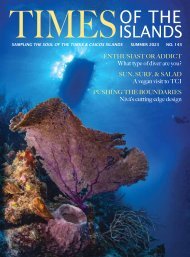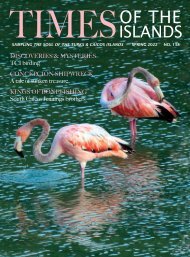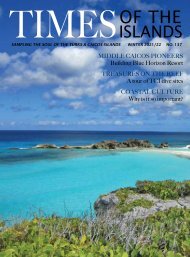Times of the Islands Summer 2022
Presents the "soul of the Turks & Caicos Islands" with in-depth features about local people, culture, history, environment, real estate, businesses, resorts, restaurants and activities.
Presents the "soul of the Turks & Caicos Islands" with in-depth features about local people, culture, history, environment, real estate, businesses, resorts, restaurants and activities.
Create successful ePaper yourself
Turn your PDF publications into a flip-book with our unique Google optimized e-Paper software.
green pages newsletter <strong>of</strong> <strong>the</strong> department <strong>of</strong> environment & coastal resources<br />
TCI CLIMATE CHANGE SUMMIT<br />
The Turks & Caicos <strong>Islands</strong> Climate Change Charter was signed on Earth Day, April 22, <strong>2022</strong>. Shown here are (from left): Hon. Minister Vincent<br />
Wheatley, British Virgin <strong>Islands</strong>; Hon. Walter Roban, Bermuda’s Deputy Premier; Hon. Rhondalee Braithwaite-Knowles, Attorney General Turks<br />
& Caicos <strong>Islands</strong>; Hon. Minister Josephine Connolly, Ministry for Tourism and <strong>the</strong> Environment; and Cherylann Jones, Permanent Secretary,<br />
Ministry for Tourism and <strong>the</strong> Environment.<br />
collective action can change <strong>the</strong> catastrophic trajectory<br />
that we are currently on. We hear about and speak on<br />
<strong>the</strong> devastating effects that climate change poses to <strong>the</strong><br />
social and economic fabric <strong>of</strong> <strong>the</strong> Turks & Caicos <strong>Islands</strong>,<br />
however, <strong>the</strong> ill effects on our material and non-material<br />
culture is not at <strong>the</strong> forefront <strong>of</strong> <strong>the</strong> discussion. This is<br />
<strong>the</strong> general trend globally, as culture is largely absent<br />
from most climate resilience and adaptation movements.<br />
The consequences for TCI are severe as our entire<br />
existence, knowledge systems, identity, heritage values,<br />
and amenity services (i.e. recreation, spiritual fulfillment,<br />
aes<strong>the</strong>tic enjoyment, etc.) are strongly influenced by our<br />
marine ecosystems and coastal landscapes, and ecosystem<br />
change can have significant impact on cultural<br />
identity and social stability. These ecosystems are currently<br />
threatened by rising sea levels, ocean acidification,<br />
loss <strong>of</strong> biodiversity and intense wea<strong>the</strong>r events—all <strong>of</strong><br />
which are driven by climate change. What if culture could<br />
be used as a resource for addressing both climate mitigation<br />
and adaptation?<br />
Culture is intertwined with lifestyles and <strong>the</strong> social<br />
organisations that give rise to emissions <strong>of</strong> greenhouse<br />
gases. The climate change impacts <strong>of</strong> <strong>the</strong>se gases are<br />
ascribed meaning through cultural interpretations <strong>of</strong><br />
science and risk. From this standpoint, culture and its<br />
analysis is crucial in understanding <strong>the</strong> causes <strong>of</strong>, and<br />
human responses to, climate change. Moreover, cultural<br />
heritage, traditional knowledge, and natural heritage support<br />
a community’s ability to respond to climate change<br />
impacts. Intangible cultural heritage practices can also be<br />
beneficial in assisting communities adapt to a changing<br />
climate. This is seen in Bangladesh where rural communities<br />
use inherited local knowledge <strong>of</strong> water management<br />
to cope with increasing flooding incidents.<br />
In spite <strong>of</strong> <strong>the</strong> complex relationship between culture<br />
and climate change resilience, nei<strong>the</strong>r <strong>the</strong> Assessment<br />
Reports <strong>of</strong> <strong>the</strong> IPPC nor <strong>the</strong> Paris Agreement systematically<br />
include culture or cultural practices. Fortunately,<br />
UNESCO is currently calling on countries to integrate culture<br />
into <strong>the</strong>ir climate change policies and strategies.<br />
56 www.timespub.tc


